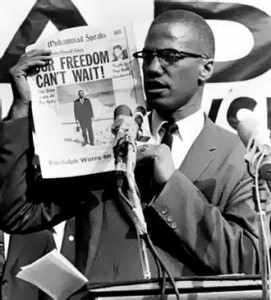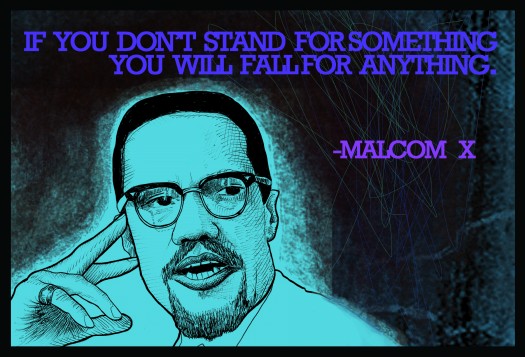Ossie Davis on Malcolm X
 It’s Malcolm’s birthday. I love him. It’s that simple. I love him and he has inspired my life. I trace my politicization as a very young person to two books. One is the Autobiography of Malcolm X. Even after I learned that the narrative wasn’t 100% “true,” I was always grateful for its formative impact on me.
It’s Malcolm’s birthday. I love him. It’s that simple. I love him and he has inspired my life. I trace my politicization as a very young person to two books. One is the Autobiography of Malcolm X. Even after I learned that the narrative wasn’t 100% “true,” I was always grateful for its formative impact on me.
Today in honor of his birthday, I want to share an excerpt of a conversation between Ossie Davis and Manning Marable about Malcolm.
“I very rarely like to speak publicly about Malcolm, to talk about Malcolm and to explain about Malcolm. However, I feel I can do it in a situation like this, where I’m among friends, and we’re talking about somebody we love. If you talk too much about somebody, you will ultimately destroy their meaning. So I try not to talk about Malcolm too much. Having said that, Malcolm’s central position in the class struggle was in his capacity for connecting with people out in the street, drug addicts, criminals, and hustlers — these were folks outside the middle class, people that Dr. King certainly couldn’t relate to. His capacity to look in their eyes and into their souls, his ability to speak directly to them and to help turn their lives around — this is perhaps his most valuable contribution.
[…]
Malcolm had invited us to the Audubon that day, but we had a previous commitment downtown and had left the three children in Harlem with Mother. When we returned to pick them up, the kids told us that something had happened to Malcolm. We turned on the television as a bulletin interrupted the ballet. Malcolm X was dead – shot down in front of Betty and the children. We were stunned and deeply, deeply saddened. That night, we drove back into Harlem and walked the streets, mingling and talking with the crowds about Malcolm’s death and what it meant to black people.
Fear and sorrow were mixed with a desire to give Malcolm a decent funeral. Percy Sutton, Malcolm’s friend and lawyer, went from church to church trying to secure a place for Malcolm’s funeral, but most of them said no — it was too dangerous. There was a lot of politics involved and the big challenge was figuring out a way to bury Malcolm in the spirit that the community called for and the spirit he warranted. Finally Bishop Church offered his small church on Amsterdam Avenue. Sylvester Leaks, speaking for Percy Sutton and Malcolm’s family, asked me to give the eulogy and I asked him, “Why me?” The answer was that Ruby and I were widely known to have been among his earliest friends and supporters. Also, I was a man with whom nobody in this shooting argument could quarrel. Ruby and I were honored to accept.
Well, that Saturday, we went to the little Faith Memorial Chapel on Amsterdam Avenue. It wasn’t much of a day and I remember there was no sunshine at all. The funeral was at ten o’clock. Ruby and I sat in the pulpit and our job was to read the messages that were pouring in. At the proper time, I arose to give the eulogy, trying to be simple, plain, honest, and sincere, saying by way of farewell what, in my heart, I believed Harlem wanted me to say. Afterward, we followed him to the cemetery where the professional grave diggers were waiting. We said no and took their shovels from them. Malcolm was ours, and if he had to be buried, we would do it. He loved us and we loved him.
(Source: “A Conversation with Ossie Davis,” Souls 2, 3 (Summer 2000): pp.14-16)
“He loved us and we loved him.” – This says it all… Here’s an excerpt Ossie Davis’s eulogy for Malcolm. Happy Birthday Malcolm, we carry on in your name.

